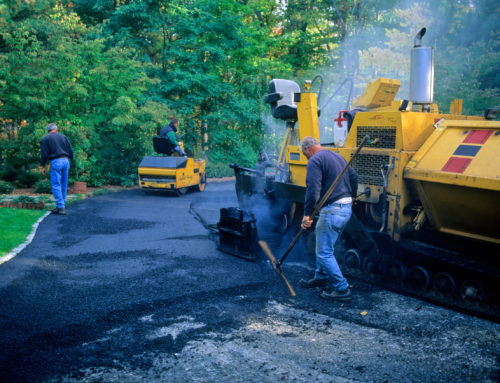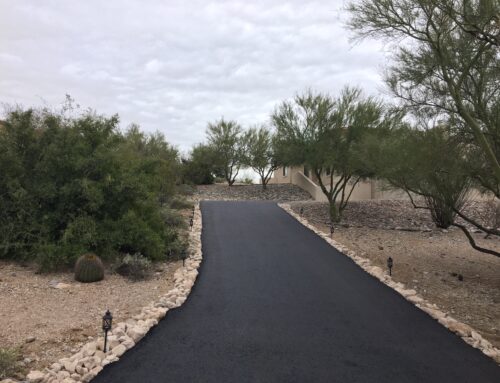Paving asphalt in Arizona requires special attention, thanks to several factors due to the unique climate and environmental conditions of the state. While the process of asphalt paving is similar in most areas, the conditions in Arizona are particular at times, and so, it is important to understand these factors to ensure a successful pavement project. This blog will dig deep into these special requirements and provide insight into how contractors can navigate them.
Factors That Influence Asphalt Paving in Arizona
Temperature
Arizona is known for its extreme heat, with summer temperatures exceeding 100°F, and sometimes by a lot. High temperatures can affect the quality and durability of asphalt, making it more susceptible to cracking and deformation. Therefore, it is crucial to ensure that the asphalt is laid at the appropriate temperature. The temperature of the asphalt mixture should be between 275°F and 300°F when it is delivered to the job site. If the temperature is too low, the asphalt may not compact properly, resulting in a weakened pavement. If the temperature is too high, the asphalt may become too soft and deform under the weight of traffic. Therefore, it is important to have a trained technician on site to monitor the temperature and ensure that the asphalt is delivered at the correct temperature.
Sun Exposure
It’s not just the heat doing work on the asphalt, the sun itself is a problem! Arizona is known for its intense sun exposure, which can cause asphalt to dry out and become brittle, leading to cracking and damage. To prevent this, a high-quality asphalt mix with UV protection is required. The mix should contain a polymer additive that protects the asphalt from the damaging effects of the sun. The polymer additive helps the asphalt to retain its flexibility and prevent cracking. In addition, the contractor should apply a sealcoat to the pavement after installation to protect it from further damage from the sun’s UV rays.
Soil Type
The type of soil in Arizona can vary greatly from one location to another. In some areas, the soil is sandy, while in others, it is rocky or clay-like. The soil can affect the stability of the pavement. Therefore, it can be useful to perform soil tests to determine the appropriate asphalt mix and thickness. Here at Sunrise Asphalt we don’t perform them ourselves but we can recommend some. Soil tests determine the soil’s bearing capacity, which is the amount of weight the soil can support. The bearing capacity is used to determine the thickness of the asphalt pavement required to support the expected traffic loads. More on traffic loads later!
Drainage
Arizona’s monsoon season can cause heavy rainfall and flash flooding, which can damage the asphalt pavement. Proper drainage is crucial to prevent water from pooling on the pavement, which can lead to erosion, cracks, and potholes. The pavement should be sloped to direct water away from the surface and toward drainage structures such as catch basins and storm drains. In addition, the contractor should ensure that the pavement has a solid sub base that can withstand the pressure of heavy rainfall and prevent the pavement from shifting or cracking. When we pave or seal we go with the outline of the exsiting pavement or area to make sure it fits the existing structures. While we can’t warranty or guarantee drainage (no asphalt company can) – we’re not hydrologists, you see, we can recommend hydrologists to customers.
Traffic Loads
Arizona’s heavy truck traffic can cause significant wear and tear on the pavement. Therefore, it is important to use a high-quality asphalt mix and to design the pavement to withstand the expected traffic loads. The asphalt mix should be designed to resist deformation, cracking, and fatigue. The contractor should also consider the expected traffic loads when designing the pavement thickness. If the pavement is not thick enough, it may not be able to withstand the weight of heavy trucks, resulting in premature failure.
In addition to these special requirements, contractors must comply with all local and state regulations. The contractor should obtain all necessary permits and ensure that the project meets all zoning and building code requirements. The contractor should also ensure that the project meets all safety requirements, such as providing traffic control devices and personal protective equipment for workers.
Paving asphalt in Arizona requires special attention, but if you can pave here, you can pave anywhere! That’s how Sunrise Asphalt approaches it and that’s why we have paved more square footage of asphalt than anyone around! Tucson is made up of our streets!
Have an asphalt job that needs professional attention? Look no further. Here at Sunrise Asphalt, we’ve been paving the way for Tucson for over 40 years!
Give us a call or fill out our form for a free estimate on your asphalt job.
No matter the job, the owner is always on site – guaranteeing the highest quality work!



